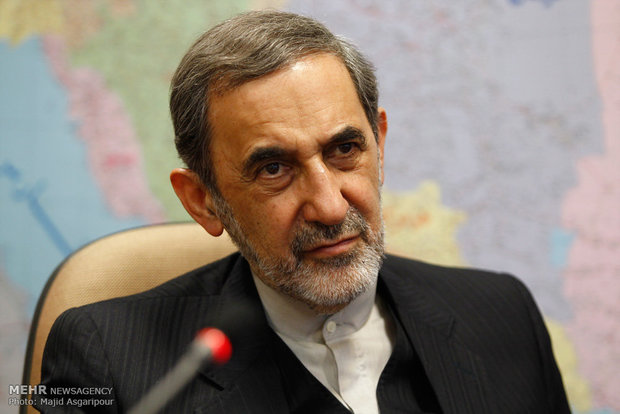Speaking at a meeting with the visiting Syrian Prime Minister Imad Khamis on Wednesday morning, Head of Strategic Research Center of the Expediency Council Ali Akbar Velayati appreciated presence of the Syrian delegation in Tehran and called for development of multilateral cooperation between the two sides.
Referring to the reached agreement between Tehran and Damascus during the present visit, the Iranian official urged both parties to pursue complete implementation of the newly-signed deals.
Leader’s foreign affairs aid went on to congratulate Syrian people and government as well as their allies on recent victories in Aleppo.
He evaluated ceasefire as a positive step as long as it would not provide terrorists with re-equipment opportunities.
He noted that the upcoming meeting in Astana will be an outcome of triumphs obtained by nation and government of Syria and their allies and that it should never turn into a chance for those who had a hand in equipping terrorists and suffered defeats to prey on the political scene.
“On top of all, Americans, who have always insisted on collapse of the official government in Damascus, are seeking to make presence at Astana talks,” said the official stressing that the Islamic Republic of Iran vehemently objected to presence of US in the forthcoming talks.
He expressed concerns that, if the same trend went on, Saudi Arabia and Qatar would also seek to have a role in political talks while they have been involved in creating and equipping terrorists.
Velayati expressed hope that Astana talks would lead to a giant leap towards peace in Syria; “the peace needs to be accompanied by power and dignity of the Syrian government and nation.
Leader’s senior advisor explained that reconstruction process will begin in Syria following the war underscoring that Iran would spare no effort in that regard.
He expressed hope that peace will be restored in Syria while maintaining sovereignty and security of the friend country; “we believe that only Syrian people, rather than external forces, will be able to decide on their faith.”
Ali Akbar Velayati recalled that Tehran-Damascus ties had an influential role in maintaining the line of Resistance comenting “this explains why the Zionist regime performs air strikes over Damascus whenever its agents in Syria are weakened.”
Prime Minister of Syria Imad Khamis, for his part, voiced condolences over demise of Iran’s former president Ayatollah Hashemi Rafsanjani saying “age-old ties between Iran and Syria are deep-rooted in historical relations between the two sides.”
“Bilateral ties between Tehran and Damascus were founded by late Imam Khomeini and Hafiz Assad and are currently being pursued by Bashar al-Assad and the Leader of Iranian Revolution,” said the visiting official voicing optimism that present relations will become stronger in future.
He further reassured that efforts would continue until terrorists were completely eliminated fight for keeping sovereignty of Syria would never come to an end.
“Despite all challenges, the Syrian army always stood on our side,” noted Khamis adding that the victory in Aleppo was made possible by the unwavering support of the Islamic Republic of Iran.
Referring to reconstructing of Syria in the post-war era, he stated that “the age-old coalition between Iran and Syria will persist for ever and a team, comprising Syrian ministers and experts, have travelled to Iran aiming to bolster multilateral ties with Iran especially in economic areas.”
The Syrian PM, while pointing to the held meetings in Tehran, added that a long-term strategic approach was being sought for collaborations between Iran and Syria.
Imad Khamis touched upon singing of five Memoranda of Understanding (MoUs) between the two countries during his visit to Tehran reiterating that a sixth agreement was being prepared which pertained to investment of Iranians in Syrian port.
On upcoming talks in Astana, the official underlined that an initiative was being sought so that the meeting’s outcome would be in favor of Syria; “accordingly, military operations will continue and we believe that the issue of terrorism can be resolved only through military solutions.”
The upcoming Astana meeting aims to reach a political solution for the six-year conflict in Syria by bringing the opposition groups to the negotiating table with government representatives.
HA/3880477/3880546

























Your Comment